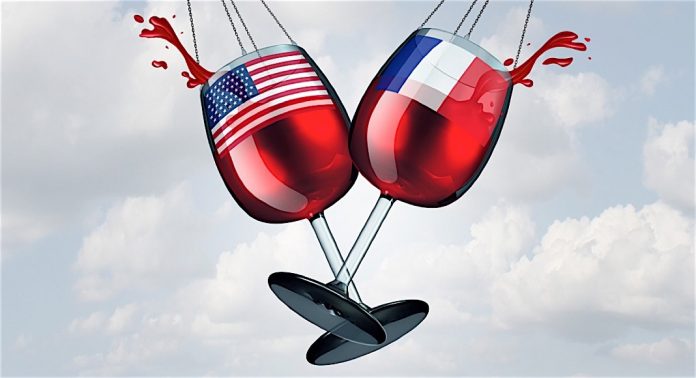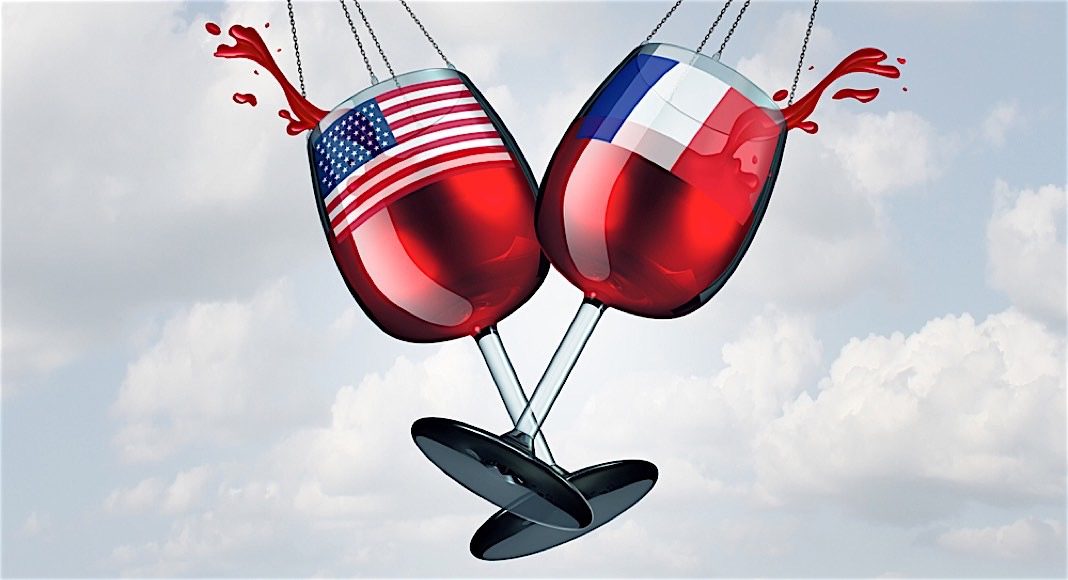
Halfway between Orlando and Tampa, the city of Winter Haven, known for its LegoLand, has little to dream the defenders of French soil. And yet, the eyes of many producers and importers of hexagonal wines are turning to these Florida marshes recently, as one of the places where could hope come in the face of 25% customs duties imposed on wines French since late October by the Trump administration.
It is in the ultra-modern bottling lines of Florida Caribbean Distillers, located in Winter Haven, that the case is played. Known for its production of rum and sangria, the company announced a few days after the entry into force of the American sanctions against French wine, the launch of a new rosé, named … The Rosey and produced in the Nîmes region by the group of producers "Vignobles & Compagnie". But unlike other French viticultural productions, the wine in question is not affected by the new customs duties because it is bottled in the United States after being imported in bulk. The tariffs decided by the US administration concern only wines imported in bottles of less than two liters. Beyond, no tax to pay!
boon
For Florida Caribean Distillers, it's a bargain. "We are working on this project to import wine, bottled at home, for some time, says Dave Steiner, commercial director of the company. Wine, and especially rosé, is the category that is doing particularly well in our liquor sector. We wanted to get into this market. And all of a sudden, these customs duties arrive and give us a price advantage of 25%! " The wine is marketed mainly in the eastern United States and the midwest, and targets the mass market: some 600,000 bottles will go on sale at around $ 9.90 retail.
Obviously, the launch did not go unnoticed by French importers and distributors. Owner of Empire State of Wine, retailer in New York, Eddy Le Garrec says he has, with its importing partners, "Found a bottling plant in Montreal" and plans to import in bulk the rosé de provence that his customers love. "it will cost us even less than importing bottles before tariffs. Finally, with these sanctions, they may have done us a favor. " is he fun.
For its part, the representative of a major producer of the Rhone Valley who does not wish to speak publicly about the exploitation of this "loophole " confirms: "we immediately began to look at the possibility of importing bulk and bottling here. But the problem is that there is little capacity on bottling lines. " Above all, setting up a new logistic and commercial chain to move from importing bottles to bulk imports can take a long time and require disproportionate investment if the sanctions were to last only a short time.
The 14 ° bar
On the other hand, there is another "hole" in the US sanctions system that is already fully exploited. Only wines with less than 14 ° of alcohol are affected. The US administration has never explained its choice – not more than that of not imposing rights on champagne and other sparkling wines for example – but it takes again the traditional distinction of the American regulation between "wine table"(Less than 14 °) and"liquor wine "(more than 14 °). But the reality of production is that many wines are in fact very close to this limit. "Testing the degree of alcohol is also not an exact science, explains an industry expert. As a result, the authorities traditionally tolerate a margin of error. Thus a "table wine" tested at 13.8 ° can quite legally be labeled at 14.2 ° and evade customs duties by 25%. Added to this gray area is the effect for the 2018 vintage – which is the bulk of imports at this time – of the drought, which has increased the sugar content, and therefore the alcohol content, of many productions. passing in the category of more than 14 °.
But if these two "Loopholes" American regulations fuel many conversations in the French wine community in the United States, and their effect, like that of sanctions more broadly, is difficult to measure at the moment. "What we see above all, note on the side of the Embassy of France, it is that there has been a rise in orders between the announcement of sanctions in August and their entry into force in October. This is what we advised on the industry ". Eddy Le Garrec of Empire State of Wine did just that: "I have very big stocks, I do not import anymore by the end of the year". The retailer even went further, using the "tariffs"" as a commercial argument: "I sent special offers to my customers telling them that they were the last bottles before the price increase". Result, a turnover more than doubled in October.
But this windfall effect is by definition limited in time. The first bottles arrived in the United States after the entry into force of the additional customs duties are just starting to reach retailers. "And there, the "loopholes " and other tips are not going to be enough, it will be necessary to fight on the prices " notes Antonin Bonnet, export director of Maison Chapoutier in New York. The producer of the Rhône cut the pear in half with its importer: "We are lowering our prices by 12% and the importer by 11% to make up the entire tax". Several US distributors have simply canceled orders from producers who did not agree to lower their prices to offset the tax.
In 2018, France had sold a billion euros of still wines (those concerned by the additional tax) in the United States. The French Ministry of the Economy estimates that the new customs duties could cost up to 300 million euros for the sector hexagonal wine, full year. Some industry leaders are even more alarmist. Antoine Leccia, President of the Federation of Wine and Spirits Exporters of France (FEVS), says "fear a drop in sales of around 50% ".






![[Replay] The Consul General in Washington answers your questions](https://californialines.com/wp-content/uploads/2020/07/Replay-The-Consul-General-in-Washington-answers-your-questions-100x70.jpg)


